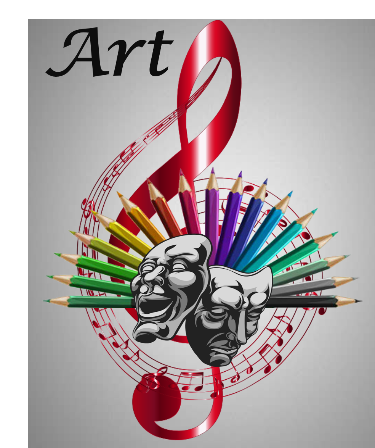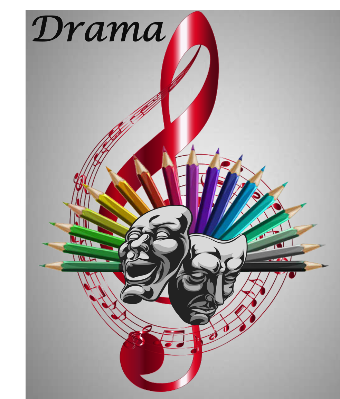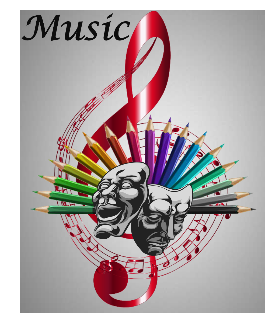The Expressive Arts Faculty comprises of Art & Design, Drama and Music.
The Expressive Arts Faculty
“But now, O Lord, you are our Father; we are the clay, and you are our potter; we are all the work of your hand.” - Isaiah 64:8

Our Vision and Intent
The ARTS provide a foundation for cultivating creativity, confidence and independence and supports a young person’s intellectual and emotional understanding of their world.
Expressive Arts broadens the minds of young people, fostering an environment of respect, acceptance and understanding of cultural diversity within a welcoming and supportive environment that everyone can feel part of. Opportunities for self expression leads to personal development and growth, to increased maturity and confidence within young people and enhances their life skills and lets their light shine.
Our faculty is committed to supporting the ethos of the school in nurturing the journey that young people take, discoveries that see their faith developing as well as their new found skills and talents. We study themes and topics that are relevant to an ever changing world and encourage young people to participate and engage in discussing a range of issues. Central to this commitment is the celebration of students’ gifts and talents.
Key Stage 3 teaching will have a practical approach giving students as many opportunities as possible to explore their creative skills whether they be artistic, dramatic or musical. A large emphasis will be placed upon allowing pupils to create a practical response to the themes and topics explored, be that the creation of a piece of art or a dramatic or musical presentation. The curriculum will allow for students to develop their skills as independent learners as well as encouraging students to work collaboratively on creative pieces. Embedded into the teaching will be key terms as appropriate to each area of study that will provide a foundation for students who then go on to study Expressive Arts subjects as a higher level. It is important that the Key Stage 3 curriculum is exciting so as to grab the attention of the young people in our care, inspiring them to develop their skills and develop their talents further in a safe and welcoming environment. In order that we continue to inspire young people, the curriculum should always be subject to review so that it continues to grow and change to suit the context of our students and the world in which they live.
At Key Stage 4, students have the opportunity to study Art, Drama and Music at GCSE/BTEC level. For either pathway, students will have the opportunity to develop their creative skills further. The context of the cohorts we have at KS 4 will have an impact upon the pathway chosen so that we are always seeking to support their educational journey be that academic or vocational. It is important that the study is appropriate to the cohort in order that they can succeed and flourish. It is also important that our curriculum shifts and changes to suit the needs of our students and their social context, for example shifting to explore a theme/topic that is relevant to their world. Students will be introduced to artists and practitioners as relevant to their selected course as well as being taught about different styles and genres of art, music and theatre, thus giving them a sound foundation to develop their own skills and encouraging them to appreciate a range of art forms.
Embedded across both key stages there should be the opportunity to pose ‘big questions’ to enable students to develop as reflective learners. It is important that all our curriculum is accessible and relevant to our students allowing them to both grow in confidence as well as stretching and challenging them to explore new ideas and concepts.
Expressive Arts students should be given plenty of opportunities to develop their skills beyond the classroom, perhaps by sharing their artwork as part of an exhibition, or by participating in theatre trips and school productions. In addition to the classroom curriculum, it is of the upmost importance that as a faculty we extend our curriculum by offering a variety of extracurricular experiences for our students to enable them to grow further, increase their confidence and provide a range of opportunities for us to celebrate their gifts and talents across the school. As a faculty we play a key role in supporting the Catholic ethos of the school, working in collaboration with other teams to share our gifts and talents within school liturgies so that students feel a sense of engagement in these experiences which support the growth of their faith.
Art Curriculum Plans
Literacy (including subject vital vocab)
Literacy in Art can be linked to the Elements of Art. It is important to use a variety of words when
describing, analysing and evaluating different artworks which contain a variety of methods across different
genres. We use this vocabulary when researching artists and art movements and we also use it when being
critical of our own work.
Click here for our Subject Vital Vocab
Revision/supporting materials and Learning Wall
https://www.bbc.co.uk/bitesize - for both KS3 and GCSE resources, galleries and guidance.
http://lightboxresource.co.uk/- exam Board Resource for GCSE pupils.
https://www.tate.org.uk/art/student-resource/exam-help - to take a look at past exam questions and research starting points.
https://www.tate.org.uk/kids - a wonderful resource for learning about Artists and Art Movements.
https://www.tate.org.uk/ - access to the Tate collections from all 4 galleries.
https://artuk.org/ - access hundreds of public art collections and search by topic.
https://www.guggenheim.org/ - access to collections and virtual tours of the Guggenheim sites.
https://www.britishmuseum.org/ - search for artefacts and learn about 2 million years of history and culture.
https://www.theartstory.org/ - a great starting point for research into Modern Artists.
https://www.pinterest.co.uk/ - search for ideas and inspiration for every topic under the sun.
‘Let your light shine before others, that they may see your good deeds and glorify your Father in heaven.’ - Matthew 5:16

Our Vision and Intent
The ARTS provide a foundation for cultivating creativity, confidence and independence and supports a young person’s intellectual and emotional understanding of their world.
Expressive Arts broadens the minds of young people, fostering an environment of respect, acceptance and understanding of cultural diversity within a welcoming and supportive environment that everyone can feel part of. Opportunities for self expression leads to personal development and growth, to increased maturity and confidence within young people and enhances their life skills and lets their light shine.
Our faculty is committed to supporting the ethos of the school in nurturing the journey that young people take, discoveries that see their faith developing as well as their new found skills and talents. We study themes and topics that are relevant to an ever changing world and encourage young people to participate and engage in discussing a range of issues. Central to this commitment is the celebration of students’ gifts and talents.
Key Stage 3 teaching will have a practical approach giving students as many opportunities as possible to explore their creative skills whether they be artistic, dramatic or musical. A large emphasis will be placed upon allowing pupils to create a practical response to the themes and topics explored, be that the creation of a piece of art or a dramatic or musical presentation. The curriculum will allow for students to develop their skills as independent learners as well as encouraging students to work collaboratively on creative pieces. Embedded into the teaching will be key terms as appropriate to each area of study that will provide a foundation for students who then go on to study Expressive Arts subjects as a higher level. It is important that the Key Stage 3 curriculum is exciting so as to grab the attention of the young people in our care, inspiring them to develop their skills and develop their talents further in a safe and welcoming environment. In order that we continue to inspire young people, the curriculum should always be subject to review so that it continues to grow and change to suit the context of our students and the world in which they live.
At Key Stage 4, students have the opportunity to study Art, Drama and Music at GCSE/BTEC level. For either pathway, students will have the opportunity to develop their creative skills further. The context of the cohorts we have at KS 4 will have an impact upon the pathway chosen so that we are always seeking to support their educational journey be that academic or vocational. It is important that the study is appropriate to the cohort in order that they can succeed and flourish. It is also important that our curriculum shifts and changes to suit the needs of our students and their social context, for example shifting to explore a theme/topic that is relevant to their world. Students will be introduced to artists and practitioners as relevant to their selected course as well as being taught about different styles and genres of art, music and theatre, thus giving them a sound foundation to develop their own skills and encouraging them to appreciate a range of art forms.
Embedded across both key stages there should be the opportunity to pose ‘big questions’ to enable students to develop as reflective learners. It is important that all our curriculum is accessible and relevant to our students allowing them to both grow in confidence as well as stretching and challenging them to explore new ideas and concepts.
Expressive Arts students should be given plenty of opportunities to develop their skills beyond the classroom, perhaps by sharing their artwork as part of an exhibition, or by participating in theatre trips and school productions. In addition to the classroom curriculum, it is of the upmost importance that as a faculty we extend our curriculum by offering a variety of extracurricular experiences for our students to enable them to grow further, increase their confidence and provide a range of opportunities for us to celebrate their gifts and talents across the school. As a faculty we play a key role in supporting the Catholic ethos of the school, working in collaboration with other teams to share our gifts and talents within school liturgies so that students feel a sense of engagement in these experiences which support the growth of their faith.
Drama Curriculum Plans
Literacy (including subject vital vocab)
Click here for our Subject Vital Vocab
Revision/supporting materials and Learning Wall
GCSE Drama (EDUQAS): https://www.eduqas.co.uk/qualifications/drama-gcse/#tab_overview
BBC Bitesize (Eduqas): https://www.bbc.co.uk/bitesize/examspecs/zdb6xyc
The National Theatre (Learn at Home): https://www.nationaltheatre.org.uk/learning/schools/secondary-and-fe/resources
RSC (Learning Zone): https://www.rsc.org.uk/shakespeare-learning-zone/
Burts Drama: https://burtsdrama.com/
Super Summary Drama and Theatre Resource Guide: https://www.supersummary.com/drama-theater-guide/
Theatre Companies (for GCSE study):
Frantic Assembly: https://www.franticassembly.co.uk/
Complicite: http://www.complicite.org/
Kneehigh: https://www.kneehigh.co.uk/
Trestle: https://www.trestle.org.uk/
Paper Birds: https://www.thepaperbirds.com/
Splendid Productions: https://www.splendidproductions.co.uk/
Careers and progression
There are a large variety of career options linked to drama and the arts under a range of categories including: performance, education, organisation, production and communication.
Performance: actor, voice over artist, costume character performer, entertainer, dancer, singer.
Education: performing arts tutor, drama therapist, community arts worker, primary teacher, drama teacher, youth worker.
Organisation: arts administration, conference organiser, events assistance, theatre manager, charity fundraiser.
Production: stage manager, runner, lighting technician, sound technician, set design, costume design, stage makeup artist.
Communication: radio presenter, market researcher, tour guide, copywriter.
‘Speak to one another with psalms, hymns, and songs from the Spirit. Sing and make music from your heart to the Lord.’ - Ephesians 5:19

Our Vision and Intent
The ARTS provide a foundation for cultivating creativity, confidence and independence and supports a young person’s intellectual and emotional understanding of their world.
Expressive Arts broadens the minds of young people, fostering an environment of respect, acceptance and understanding of cultural diversity within a welcoming and supportive environment that everyone can feel part of. Opportunities for self expression leads to personal development and growth, to increased maturity and confidence within young people and enhances their life skills and lets their light shine.
Our faculty is committed to supporting the ethos of the school in nurturing the journey that young people take, discoveries that see their faith developing as well as their new found skills and talents. We study themes and topics that are relevant to an ever changing world and encourage young people to participate and engage in discussing a range of issues. Central to this commitment is the celebration of students’ gifts and talents.
Key Stage 3 teaching will have a practical approach giving students as many opportunities as possible to explore their creative skills whether they be artistic, dramatic or musical. A large emphasis will be placed upon allowing pupils to create a practical response to the themes and topics explored, be that the creation of a piece of art or a dramatic or musical presentation. The curriculum will allow for students to develop their skills as independent learners as well as encouraging students to work collaboratively on creative pieces. Embedded into the teaching will be key terms as appropriate to each area of study that will provide a foundation for students who then go on to study Expressive Arts subjects as a higher level. It is important that the Key Stage 3 curriculum is exciting so as to grab the attention of the young people in our care, inspiring them to develop their skills and develop their talents further in a safe and welcoming environment. In order that we continue to inspire young people, the curriculum should always be subject to review so that it continues to grow and change to suit the context of our students and the world in which they live.
At Key Stage 4, students have the opportunity to study Art, Drama and Music at GCSE/BTEC level. For either pathway, students will have the opportunity to develop their creative skills further. The context of the cohorts we have at KS 4 will have an impact upon the pathway chosen so that we are always seeking to support their educational journey be that academic or vocational. It is important that the study is appropriate to the cohort in order that they can succeed and flourish. It is also important that our curriculum shifts and changes to suit the needs of our students and their social context, for example shifting to explore a theme/topic that is relevant to their world. Students will be introduced to artists and practitioners as relevant to their selected course as well as being taught about different styles and genres of art, music and theatre, thus giving them a sound foundation to develop their own skills and encouraging them to appreciate a range of art forms.
Embedded across both key stages there should be the opportunity to pose ‘big questions’ to enable students to develop as reflective learners. It is important that all our curriculum is accessible and relevant to our students allowing them to both grow in confidence as well as stretching and challenging them to explore new ideas and concepts.
Expressive Arts students should be given plenty of opportunities to develop their skills beyond the classroom, perhaps by sharing their artwork as part of an exhibition, or by participating in theatre trips and school productions. In addition to the classroom curriculum, it is of the upmost importance that as a faculty we extend our curriculum by offering a variety of extracurricular experiences for our students to enable them to grow further, increase their confidence and provide a range of opportunities for us to celebrate their gifts and talents across the school. As a faculty we play a key role in supporting the Catholic ethos of the school, working in collaboration with other teams to share our gifts and talents within school liturgies so that students feel a sense of engagement in these experiences which support the growth of their faith.
Music Curriculum Plans
Music Development Plan
Literacy (including subject vital vocab)
Click here for our Subject Vital Vocab
Revision/supporting materials and Learning Wall
Focus On Sound: https://brownedge.musicfirst.co.uk
Careers and progression
Music Producer
Live Sound Technician
Studio Technician
Studio Manager
Orchestral Musician
Pit Musician
Musical Director/Conductor
Vocalist
Instrumentalist
Session Musician
Roadie
Instrumental Support Technician
DJ
Composer
Songwriter
Artist Manager
Venue Manager
Promoter
Marketing Executive
A&R
Broadcaster
Music Journalist/Blogger
Software Programmer
Retailer
Distributor